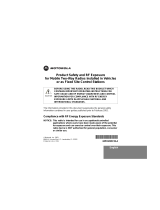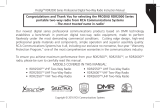
1
English
CONTENTS
CONTENTS
Radio Overview . . . . . . . . . . . . . . . . . . . . 3
Operation and Control Functions . . . . . . . . 3
Radio Controls . . . . . . . . . . . . . . . . . . . 3
Programmable Buttons . . . . . . . . . . . . 3
Audio Signal Tones. . . . . . . . . . . . . . . . 6
Getting Started . . . . . . . . . . . . . . . . . . . . . 7
Battery Information. . . . . . . . . . . . . . . . . . . 7
Battery Care and Tips . . . . . . . . . . . . . . 7
Recycling or Disposal of Batteries . . . . 8
Charging the Battery . . . . . . . . . . . . . . . 8
Accessory Information . . . . . . . . . . . . . . 9
Attaching the Battery . . . . . . . . . . . . . . . . . 9
Removing the Battery. . . . . . . . . . . . . . . . . 9
Attaching the Antenna . . . . . . . . . . . . . . . 10
Removing the Antenna. . . . . . . . . . . . . . . 10
Attaching the Belt Clip . . . . . . . . . . . . . . . 11
Removing the Belt Clip. . . . . . . . . . . . . . . 11
Radio Operation . . . . . . . . . . . . . . . . . . . 12
Turning the Radio On-Off. . . . . . . . . . . . . 12
Adjusting the RadioÕs Volume . . . . . . . . . 12
Selecting a Radio Channel . . . . . . . . . . . .12
Sending a Call . . . . . . . . . . . . . . . . . . . . . .12
Receiving a Call. . . . . . . . . . . . . . . . . . . . .12
Radio Calls . . . . . . . . . . . . . . . . . . . . . . . .13
Selective Call. . . . . . . . . . . . . . . . . . . . . . .13
Making a Selective Call . . . . . . . . . . . .13
Receiving a Selective Call . . . . . . . . . .13
Emergency Call . . . . . . . . . . . . . . . . . . . . .14
Lone Worker . . . . . . . . . . . . . . . . . . . . . . .15
Talkaround. . . . . . . . . . . . . . . . . . . . . . . . .16
Features . . . . . . . . . . . . . . . . . . . . . . . . . .17
Transmit Power . . . . . . . . . . . . . . . . . . . . .18
Whisper . . . . . . . . . . . . . . . . . . . . . . . . . . .19
Call Forward . . . . . . . . . . . . . . . . . . . . . . .20
Voice Operated Transmit (VOX) . . . . . . . .21
Voice Recorder . . . . . . . . . . . . . . . . . . . . .22
Scan . . . . . . . . . . . . . . . . . . . . . . . . . . . . .23
Starting or Stopping Scan . . . . . . . . . . . . .23
Talkback . . . . . . . . . . . . . . . . . . . . . . . . . .23
Deleting a Nuisance Channel . . . . . . . . . .24
Adding a Deleted Nuisance Channel. . . . .24






















